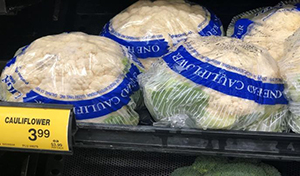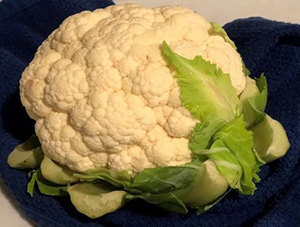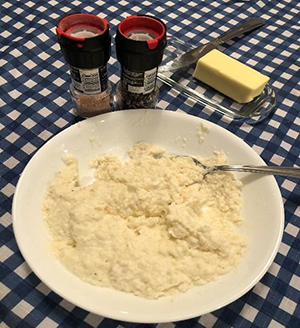
It’s white, it’s an underdeveloped flower bud, its broccoli’s closest relative, it’s rice, it’s pizza, that’s right it's cauliflower. If you go out to eat or you walk through the grocery store’s produce or frozen sections, you’re likely to see a cauliflower product like cauliflower pizza, mashed cauliflower or cauliflower rice. So, what’s all the buzz about Cauliflower? These products are substituting for higher carbohydrate dishes and starchy vegetables while packing extra nutrients and allergy substitutes in a great plant-based option.
Cauliflower has much to offer being both filling and high in fiber. At just 25 calories per cup cauliflower offers folate, vitamin A, Vitamin C, potassium and B6 making it a good replacement for foods that may be higher in calories and lower in vitamins and minerals. According to the National Cancer Institute cauliflower has been linked to cancer prevention due to its phytochemicals. Cauliflower packs a lot of nutrients in its white (sometimes yellow, green or purple) bunch.

Besides fighting disease cauliflower makes a good case for other contributions to our overall health. It’s high in fiber and water so it promotes bowel as well as bone health. Does your skin look better? You may want to thank cauliflower as it is another benefit the vegetable offers. Cauliflower, a cruciferous vegetable, contains Choline which can improve sleep, foster better muscle movement, and support learning and memory. It seems to have endless benefits.

Cauliflower is also a tasty alternative for people who have Celiac Disease or Gluten Sensitivity. Gluten Sensitivity or Celiac Disease means a person cannot indulge in pizza made from wheat flour, so cauliflower makes a welcomed alternative. It also provides an extra serving of veggies in their diet while reducing calories and increasing vitamin and mineral intake – imagine, pizza that may help fight chronic disease!
Cauliflower is a good source of fiber that helps with digestion and maintaining a healthy weight. In just one cup of this white veggie there is 3 grams of fiber. The United States Department of Agriculture (USDA) recommends fiber intake of 25 grams for women up to age 50 and 38 grams for men. Women over 50 should have 21 grams of fiber daily while men require 30 grams daily. On average Americans are only getting about 10–15 grams per day putting us well below our required need for daily fiber. Adding mashed cauliflower instead of mashed potatoes to your dinner routine will double your fiber intake and help to increase your overall fiber intake.
As is the case with any food that becomes popular as a new ‘superfood’ cauliflower can be detrimental in large quantities. It contains Vitamin K which can interact with certain medications so it's best to know what interactions your medications may have. Avoid overindulging on any one type of food and seek to get a good variety of foods for a balanced diet. Don’t forget to read the labels on new products you try with cauliflower and make sure the ingredient list is minimal rather than full of added salts, sugars, fats and chemicals. Give cauliflower alternatives a try to add more fiber, vitamins and minerals to your diet with a tasty veggie.
Nutrition Facts |
|
Amount per serving |
|
Calories |
96 |
% Daily Value* |
|
Total Fat7.8g |
10% |
Saturated Fat 4.7g |
24% |
Cholesterol 24mg |
8% |
Sodium103mg |
4% |
Total Carbohydrate4.5g |
2% |
Dietary Fiber 1.3g |
5% |
Total Sugars 1.8g |
|
Protein 3.1g |
|
Vitamin D 0mcg |
0% |
Calcium 45mg |
3% |
Iron 1mg |
3% |
Potassium 202mg |
4% |
*The % Daily Value (DV) tells you how much a nutrient in a food serving contributes to a daily diet. 2,000 calorie a day is used for general nutrition advice. |
|
Roasted Garlic Cauliflower Mash
2 medium cauliflower, cut into florets
6 oz. fat free or low-fat cream cheese, softened
⅓ c. fat free milk
4–6 cloves of garlic, roasted
½ teaspoon Olive Oil
Kosher salt
Freshly ground black pepper
Freshly chopped chives, for garnish
Butter, for serving
- Trim the top of the garlic off and place in a covered dish. Roast at 400 degrees for 30–40 minutes. Remove from the oven and set aside to let cool.
- Bring a large pot of water to a boil. Add cauliflower florets and cook until tender, 10 minutes. Drain well, pressing with paper towels or a clean dish towel to remove as much excess water as possible.
- Return to pot and mash cauliflower with a potato masher until smooth and no large pieces remain.
- Remove roasted garlic from skins when cool by squeezing the garlic cloves. Add garlic pulp to cauliflower.
- Stir in cream cheese and milk and season with salt and pepper. Mash until completely combined and creamy. (Add a couple tablespoons more milk until you reach desired consistency.)
- Garnish with chives, season with more pepper, and top with a pat of butter.
References
May 2020

